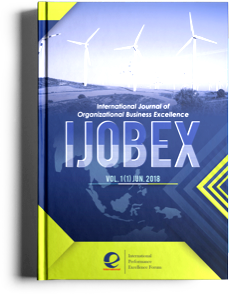Abstract
The potential of knowledge loss when an employee retires or resigns is high at PT. XYZ a plastic injection company in Indonesia. Therefore, it is required to evaluate their knowledge retention strategy (KRS) and developing a knowledge management system (KMS). The evaluation of KRS using Organizational Knowledge Retention Framework developed by David DeLong and for designing KMS model using the 10-Step KM Roadmap method developed by Amrit Tiwana. Through a well-developed KRS and KMS design model, PT. XYZ can overcome the problem of losing the knowledge that occurs because employees retire or resign.
References
Drucker, P. F. (1992). The new productivity challenge. Harvard business review, 696:6979.
DeLong, W. D. (2004). Lost knowledge: confronting the threat of an aging workforce. New York: Oxford University Press.
Alavi, M. & Leidner, D. E. (2001). Review: Knowledge management and knowledge management systems' conceptual foundations and research issues. MIS Quarterly, 25(1), 107-136.
Beveren, J. V. (2002). A model of knowledge that refocuses knowledge management. Journal of Knowledge Management, 6(1), 18-22.
Halawi, L., Aronson, J. & McCarthy, R. (2005). Resource-Based View of Knowledge Management for Competitive Advantage. Electronic Journal of Knowledge Management, 3(2), 75-86.
Bhatt, G. D. (2001). Knowledge management in organizations: examining the interaction between technologies, techniques, and people. Journal of Knowledge Management, 5(1), 68-75.
Daghfous, A., Belkhodja, O. & Angell, L. C. (2013). Understanding and managing knowledge loss. Journal of Knowledge Management, 17(5), 639-660.
Levallet, N. & Chan, Y. E. (2016). Chapter 7: knowledge loss and retention: the
paradoxical role of IT, Successes and Failures of Knowledge Management. Cambridge, UK: Elsevier.
Levallet, N. & Chan, Y. E. (2018). Organizational knowledge retention and knowledge loss. Journal Of Knowledge Management, 23(1), 176-199.
Tiwana, A. (2002). The Knowledge Management Toolkit. Second Edition. Prentice Hall.

This work is licensed under a Creative Commons Attribution-NonCommercial-ShareAlike 4.0 International License.
Copyright (c) 2019 BINUS Higher Education

